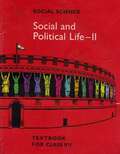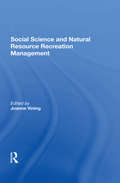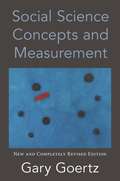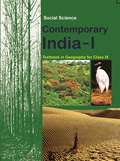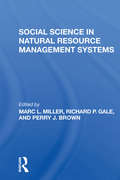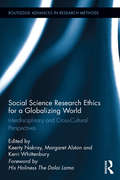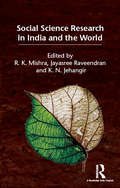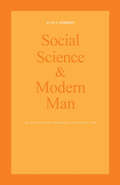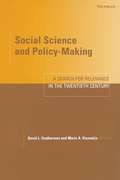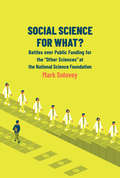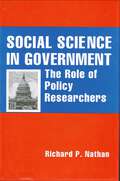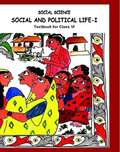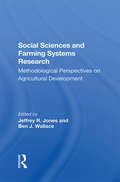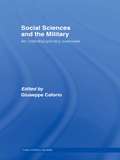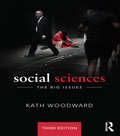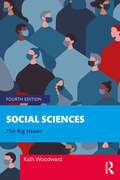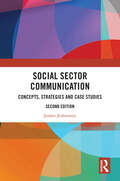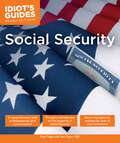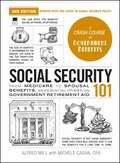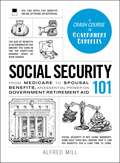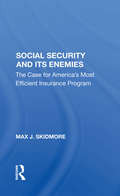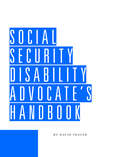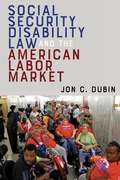- Table View
- List View
Social Science - Social And Political Life class 8 - Andhra Pradesh Board
by State Council of Educational Research and Training Andhra PradeshThis book has total five units. The indian constitution and secularism, Parliament and the making of laws, The judiciary, Social justice and the marginalized, Economic presence of the government. Students can learn about this topics Exercises, Glossary.
Social Science - Social and Political Life-2 class 7 - NCERT - 23
by National Council of Educational Research and TrainingThe NCERT textbook "Social and Political Life–II" for Class VII provides a comprehensive exploration of social and political concepts for students. The book covers diverse topics, including understanding diversity, government, and the role of citizens. It delves into the functioning of local governments, emphasizing the importance of civic participation and democratic values. The textbook also addresses social issues, such as discrimination and inequalities, encouraging critical thinking and awareness among students. Through engaging narratives, activities, and case studies, it aims to foster a holistic understanding of the social and political landscape, promoting informed citizenship and a sense of responsibility towards society. The book aims to equip students with the knowledge and skills needed to navigate and contribute meaningfully to the complexities of the social and political world.
Social Science And Natural Resource Recreation Management
by Joanne ViningThis book deals with the interaction of various social groups, and the extent to which they may or may not conflict. It focuses on the interface between the various publics related to recreation, including recreationists themselves.
Social Science Concepts and Measurement: New and Completely Revised Edition
by Gary GoertzA fully revised edition of the classic reference on concepts and their role in social science researchSocial Science Concepts and Measurement offers an updated look at the theory and methodology of concepts for the social sciences. Emphasizing that most concepts are multilevel and multidimensional, this revised edition continues to bring the qualitative and quantitative closer together, with new chapters devoted to scaling, aggregation, and the methodological links between the semantics of concepts and numeric measures. In addition, it stresses that concepts are used for description and causal inference, and contain normative judgments.Initial chapters focus on conceptualization, followed by chapters on issues of measurement. The textbook examines concepts in the international arena (such as the global performance indicators used by international organizations like the UN and the World Bank), as well as classic paired concepts such as poverty and wealth, democracy and authoritarianism, and war and peace. Additionally, it explores such topics as typologies, hybrid concepts, and how complex concepts constitute complex theories. The volume serves as a guide to the methodology of concepts in the classroom and is accompanied by more than two hundred exercises. Social Science Concepts and Measurement is an indispensable resource for graduate students and scholars.
Social Science Contemporary India-1 class 9 - NCERT - 23
by National Council of Educational Research and Training"Social Science Contemporary India-I" by NCERT offers a comprehensive exploration of India's social, political, economic, and cultural landscape in a concise and accessible manner. The book delves into key themes such as India's diversity, democracy, secularism, and development, providing students with a nuanced understanding of the country's contemporary realities. Through engaging narratives, case studies, and illustrations, it navigates through various aspects of Indian society, including its historical evolution, social inequalities, political institutions, and economic transformations. With a focus on critical thinking and analytical skills, the book encourages readers to critically assess the complexities of India's social fabric and its implications for national development and global integration. Overall, "Social Science Contemporary India-I" serves as an indispensable resource for students and educators alike, fostering a deeper appreciation and understanding of India's multifaceted socio-economic landscape.
Social Science In Natural Resource Management Systems
by Marc L Miller Richard P Gale Perry J BrownThis book is about the conduct and contributions of applied social science. It represents the beginning of a new intellectual tradition in applied social science and its purpose is to foster an exchange among the variety of social scientists who are concerned with natural resource policy.
Social Science Research Ethics for a Globalizing World: Interdisciplinary and Cross-Cultural Perspectives (Routledge Advances in Research Methods #16)
by Kerri Whittenbury Margaret Alston Keerty NakrayResearch in the humanities and social sciences thrives on critical reflections that unfold with each research project, not only in terms of knowledge created, but in whether chosen methodologies served their purpose. Ethics forms the bulwark of any social science research methodology and it requires continuous engagement and reengagement for the greater advancement of knowledge. Each chapter in this book will draw from the empirical knowledge created through intensive fieldwork and provide an account of ethical questions faced by the contributors, placing them in the context of contemporary debates surrounding the theory and practice of ethics. The chapters have been thematically organized into five sections: Feminist Ethics: Cross-Cultural Reflections and Its Implications for Change; Researching Physical and Sexual Violence in Non-Academic Settings: A Need for Ethical Protocols; Human Agency, Reciprocity, Participation and Activism: Meanings for Social Science Research Ethics; Emotions, Conflict and Dangerous Fields: Issues of “Safety” and Reflective Research; and Social Science Education: Training in Ethics or “Ethical Training” and “Ethical Publicizing." This inter-disciplinary volume will interest students and researchers in academic and non-academic settings in core disciplines of Anthropology, Sociology, Law, Political Science, International Relations, Geography, or inter-disciplinary degrees in Development Studies, Health Studies, Public Health Policy, Social Policy, Health Policy, Psychology, Peace and Conflict studies, and Gender Studies. The book features a foreword by His Holiness The Dalai Lama.
Social Science Research in India and the World
by R. K. Mishra Jayasree Raveendran K. N. JehangirA unique and comprehensive study on social science research, this book highlights the status, issues, roadblocks and challenges of the field in India and certain select nations of the world. It conducts key cross-comparisons with existing literature in the area, and discusses aid policies and decisions, funding dynamics and quality of research as well as assessment systems in social science research.
Social Science and Modern Man: Alan B. Plaunt Memorial Lectures 1969
by Scott GordonThe main theme of these lectures is man's struggle to understand himself as a social being. The author argues that the chief inspiration for this effort, insofar as it has been successful, has been the rationalist philosophy of physical science, and that constructive social science has been based on this philosophy rather than upon theology and ethical philosophy. He goes on to discuss the major problems confronting man in his attempts to come to grips with the modern social world - problems of social and political organization, of equality and aspiration, of intellect and reason - and ends with a plea for liberalism and rationalism as the political and intellectual foundations of freedom and progress. This fascinating and thought-provoking apology for liberalism and the social scientist will be valuable reading for anyone interested in problems facing them both today.
Social Science and Policy-Making: A Search for Relevance in the Twentieth Century
by David L. Featherman Maris A. VinovskisThis collection of essays examines how the social sciences in America were developed as a means of social reform and later, especially after World War II, as a tool in federal policymaking and policy analysis. It also uses arenas of policymaking, such as early childhood education and welfare and its reform, as case studies in which social research was used, in policy decisions or in setting and evaluating policy goals. The book is written to aid students of public policy to appreciate the complex relationship of information--principally, of social science research--to policymaking at the federal level. David L. Featherman is Professor of Sociology and Psychology, Director and Senior Research Scientist, Institute for Social Research, University of Michigan. Maris A. Vinovskis is Bentley Professor of History, Senior Research Scientist, Institute for Social Research, Faculty member, School of Public Policy, University of Michigan.
Social Science for What?: Battles over Public Funding for the "Other Sciences" at the National Science Foundation
by Mark SoloveyHow the NSF became an important yet controversial patron for the social sciences, influencing debates over their scientific status and social relevance.In the early Cold War years, the U.S. government established the National Science Foundation (NSF), a civilian agency that soon became widely known for its dedication to supporting first-rate science. The agency's 1950 enabling legislation made no mention of the social sciences, although it included a vague reference to "other sciences." Nevertheless, as Mark Solovey shows in this book, the NSF also soon became a major--albeit controversial--source of public funding for them.
Social Science in Government: The Role of Policy Researchers (Rockefeller Institute Press Ser.)
by Richard P. NathanThis book presents a lively retrospective account of a career as an inner and outer in American government and academe by a social scientist who has spent many years conducting evaluation studies of what works—and what doesn't work—in domestic public affairs. It uses rich histories of prominent policy issues and descriptions of major studies of welfare and job programs to bring to life crucial questions about how social science can best serve social policy. This is a new, substantially updated, and expanded version of a book published by Basic Books over a decade ago.Richard P. Nathan writes about the real politics of social science research in a style for both practitioners and students of American government. Reviewing the earlier version of this book, James Q. Wilson said Nathan "summarizes in plain English what he has learned about how to evaluate public policy. It is an important book for a political system that may have wearied of adopting programs simply because they make us feel good or serve ideological ends." Robert Reischauer, President of The Urban Institute, commented, "Nathan's book is essential reading for policymakers who must look for ways to identify efficient government programs."
Social Science: India and the Contemporary World - I & Democratic Politics class 9 - Goa Board
by National Council of Educational Research and Training"India and the Contemporary World - I" and "Democratic Politics" are two essential NCERT books for Class 9 students, offering comprehensive insights into India's historical evolution and the principles of democratic governance. "India and the Contemporary World - I" delves into India's past, exploring themes such as the French Revolution, socialism, colonialism, nationalism, and the significant events that shaped the modern world. It provides a vivid portrayal of India's struggle for independence and its socio-political changes during the 18th and 19th centuries, highlighting pivotal moments and influential personalities. On the other hand, "Democratic Politics" focuses on the fundamental aspects of democracy, governance, and political institutions. It explains the functioning of democracy, electoral processes, institutions like Parliament, the judiciary, and the roles they play in sustaining a democratic society. Additionally, the book emphasizes civic responsibilities, rights, and duties of citizens in a democratic setup, aiming to cultivate an understanding of the democratic system prevalent in India. Together, these books offer a holistic view of India's historical context and the foundational principles of its democratic framework, enabling students to comprehend the nation's past and present socio-political landscape.
Social Science: Social and Political Life-I class 6 - NCERT - 23
by National Council of Educational Research and Training"Social and Political Life - I" is a comprehensive textbook designed for Class VI students, aiming to introduce them to the diverse aspects of society, politics, and governance. Through engaging narratives and activities, the textbook navigates learners through the fundamentals of social science, emphasizing the importance of understanding the world around them. It covers various topics such as diversity and discrimination, understanding government, local government, and democratic politics. The book focuses on cultivating critical thinking skills, encouraging students to analyze societal structures, political systems, and the significance of active citizenship. By delving into concepts like rights and responsibilities, power-sharing, and the role of individuals in a community, this textbook aims to instill a sense of civic consciousness and participation among young learners. It uses relatable examples and scenarios to enable students to grasp complex concepts, fostering a deeper understanding of how society functions and how individuals can contribute to positive social change.
Social Sciences And Farming Systems Research: Methodological Perspectives On Agricultural Development
by Robert Booth Jeffrey R Jones Ben J Wallace Robert E RhoadesThe publication of this book has required the cooperation of many people along the way. From its very conception, the project of bringing together experiences from ongoing Farming Systems Research projects has faced a problem of communication due to the dispersal of the participants. Dr. William Partridge and Lynne Goldstein were instrumental in the initial presentation of the symposium on Social Science participation in Farming Systems Research at the 83rd Annual Meeting of the American Anthropological Association. Ben Wallace has done an admirable job not only as editor but 8s a ilpoint m-an"- throughout the process or organizirig the conference and preparing the manuscript. He deserves credit tor expediting countless actMties that could never have otherwise been accomplished because of the vagaries or international mails and telecommunications.
Social Sciences and the Military: An Interdisciplinary Overview (Cass Military Studies)
by Giuseppe CaforioThis innovative book presents the reader with a clear international view of interdisciplinary and intradisciplinary approaches to military and conflict-resolution studies. In this first title on its subject, leading expert Giuseppe Caforio offers a thorough analysis of the new aspects and trends of the social sciences in studying the military. Since the end of the Cold War, military operations other than war, crisis-response operations, the fight against terrorism, and hi-tech warfare have posed for the militaries of all countries a new set of human and social challenges and problems of an intensity that had never been seen in peacetime. Sociology, social psychology, anthropology and the science of conflict are grappling with these issues, common to all armed forces, with a new fervour. This new book offers an update on the state-of-the-art on this theme and defines the latest study and research trends in the field. Social Sciences and the Military contains essays by some of the most highly regarded scholars on the subject and will be essential reading for all students of civil-military relations, conflict resolution and military studies in general.
Social Sciences: The Big Issues
by Kath WoodwardThe social sciences are about people and the relationships between individuals and the social and material world we live in. They are about the social structures which shape – and are shaped by – social forces such as ethnicity, race, gender, sexuality and age and the bodies we inhabit. How are these relationships changing and to what extent and how can people influence change? What are the big issues which concern us today? How can the social sciences help us to understand what is going on? Social Sciences: The Big Issues third edition looks at what matters in terms of what is changing and what remains the same in contemporary life, bringing together personal concerns and social forces. Fully revised and updated, this book explores some of the debates about how we live our personal, domestic and emotional lives at a time of change and disruption, including economic crises and uncertainties. The issues covered include: changing selves and personal lives; the role of consumption and consumerism; materialism and material culture; as well as citizenship, migration and globalization as both opportunities and sources of inequality in the contemporary world and in everyday lives. The third edition of Social Sciences: The Big Issues provides a clear, accessible introduction to the ideas and approaches of the social sciences across a range of disciplines, including sociology, psychology and politics.
Social Sciences: The Big Issues
by Kath WoodwardFully revised and updated, the fourth edition of Social Sciences: The Big Issues explores key debates about how we live our personal, domestic and emotional lives at a time of enormous, previously unimaginable change and disruption, including a pandemic that locked down households and economies. Since the third edition, everyone’s life has changed. The pandemic – at least temporarily – stopped social life as we knew it and virtually forced governments to close down their economies. This is where this edition of The Big Issues starts. Staying at home posed a radical departure from routine life, but reactions to Covid-19 have exposed the endurance of particular social relations – especially inequalities – which characterize societies worldwide. A few of the new big issues covered in this edition include: Changing selves and personal lives in light of racism and sexual and identity politics in a pandemic Changing patterns of consumption in relation to market production and what it means for climate change Changing intersections of citizenship, migration and globalization in the context of the virus crossing borders, and both the opportunities and sources of inequality involved Changing ideas about power, politics and populism in the aftermath of Brexit Building on the strong foundation of this well-loved text, this fully revised fourth edition explores how big issues and social forces intersect to create both change and evidence of continuity, especially of social inequalities. It provides a clear, accessible introduction to the ideas and approaches of the social sciences across a range of disciplines, including sociology, psychology and politics.
Social Sector Communication: Concepts, Strategies and Case Studies
by Jaishri JethwaneyCommunication, advocacy, and outreach are germane to the success of any organisation working in the social sector. This book provides a robust conceptual framework that is required to understand the demands of the sector and suggests strategies and tools for those engaged in social sector communication.This book not only highlights the theoretical underpinnings, practice, and skill of social sector communications in India but also provides an understanding of various skills and approaches required in communication including social marketing, media advocacy, social mobilisation, grassroots communication, and corporate social responsibility (CSR). With the aid of case studies, it offers suggestions on how to plan campaigns; write a concept note, field report, and press release, and effectively use social media to achieve developmental programme goals. This revised edition discusses the different perspectives of NGOs and programme implementers and helps in understanding the corporate–NGO interface vis-à-vis CSR projects.This book will be useful to students of social work, business, and management preparing for roles in social enterprises. It will also be of use to working professionals in the social sector.
Social Security (Idiot's Guides)
by Jan Yager Fred YagerAlong with Medicare, Social Security is one of the "rites of passage" older Americans experience. After contributing funds to this program their entire working lives, people are anxious to start cashing in on their monthly benefits. Idiot's Guides: Social Security offers simple and clear explanations of the history of the program, the traditional age requirement, disability and survivor benefits, and the future of Social Security. A bonus decision tree helps recipients maximize benefits based on such factors as how and when benefits are filed, marital status, and future plans.
Social Security 101, 2nd Edition: From Medicare to Spousal Benefits, an Essential Primer on Government Retirement Aid (Adams 101 Series)
by Michele Cagan Alfred MillLearn the ins and outs of the social security system in this accessible, easy-to-navigate guide with refreshed, updated information in Social Security 101, 2nd Edition.Too often, writing about social security turns the noteworthy details of the benefits into boring details about regulations or biased political arguments that would put even a diehard bureaucrat to sleep. Social Security 101, 2nd Edition, cuts out the tedious explanations and instead provides a hands-on lesson that keeps you engaged as you learn all you need to know about the federal program that&’s been around since the Great Depression. From the history of social security to its likely role in the future, this primer is packed with hundreds of entertaining tidbits and concepts that will keep you on track as you learn how to maximize your benefits. Whether you want to learn about calculating your retirement age or estimating your projected payments, Social Security 101 has all the answers—even the ones you didn&’t know you were looking for.
Social Security 101: From Medicare to Spousal Benefits, an Essential Primer on Government Retirement Aid (Adams 101 Series)
by Alfred MillLearn about Social Security and plan for your future with the help of this comprehensive and accessible guide to everything you need to know about Social Security.Understanding Social Security can be overwhelming at times and dense government websites don&’t help. Fortunately, Social Security 101 can help with easy-to-understand explanations and lessons that keep you engaged as you learn all you need to know about the federal program that&’s been around since the Great Depression. Social Security 101 will give you the most up-to-date information on this government program, such as: -Getting a Social Security card -Applying for benefits -Estimating your benefits -Disability benefits -Medicare -401(k) plans for young adults Use this guide to plan for the future so that you&’ll be comfortable in retirement. With the knowledge gained from this book, you&’ll feel more secure in your future. Whether you want to learn about calculating your retirement age or estimating your projected payments, Social Security 101 has all the answers—even the ones you didn't know you were looking for.
Social Security And Its Enemies: The Case For America's Most Efficient Insurance Program
by Max J. SkidmoreThis book explains the history and principles of the social security system. It explains why social security is sound and documents the covert war against social insurance that dates back to the passage of the Social Security Act in 1935, explaining how the opposition emerged with a vengeance.
Social Security Disability Advocate’s Handbook
by David TraverSocial Security Disability Advocate's Handbook is a sophisticated guide filled with pattern questions and supporting data that will help you (1) knowledgeably and effectively challenge vocational testimony, and (2) use the Process Unification Rulings as powerful weapons for your claimants. David Traver's sophisticated guide also serves as a valuable source for when you need to educate the ALJ about the limits placed by Social Security Rulings. Social Security Disability Advocate's Handbook shows you how to turn the Rulings into powerful weapons for your claimants: * Remind ALJs what the Rulings require with 93 "commands" to agency adjudicators excerpted from the Rulings. * Rebut common but invalid reasons ALJs use to reject claimant's allegations. * Prevent the ALJ from rejecting a medical source statement based on the ALJ's finding that the medical source was not aware of all the medical and other evidence in the file. * And more!
Social Security Disability Law and the American Labor Market
by Jon C. DubinHow social security disability law is out of touch with the contemporary American labor market Passing down nearly a million decisions each year, more judges handle disability cases for the Social Security Administration than federal civil and criminal cases combined. In Social Security Disability Law and the American Labor Market, Jon C. Dubin challenges the contemporary policies for determining disability benefits and work assessment. He posits the fundamental questions: where are the jobs for persons with significant medical and vocational challenges? And how does the administration misfire in its standards and processes for answering that question? Deploying his profound understanding of the Social Security Administration and Disability law and policy, he demystifies the system, showing us its complex inner mechanisms and flaws, its history and evolution, and how changes in the labor market have rendered some agency processes obsolete. Dubin lays out how those who advocate eviscerating program coverage and needed life support benefits in the guise of modernizing these procedures would reduce the capacity for the Social Security Administration to function properly and serve its intended beneficiaries, and argues that the disability system should instead be “mended, not ended.”Dubin argues that while it may seem counterintuitive, the transformation from an industrial economy to a twenty-first-century service economy in the information age, with increased automation, and resulting diminished demand for arduous physical labor, has not meaningfully reduced the relevance of, or need for, the disability benefits programs. Indeed, they have created new and different obstacles to work adjustments based on the need for other skills and capacities in the new economy—especially for the significant portion of persons with cognitive, psychiatric, neuro-psychological, or other mental impairments. Therefore, while the disability program is in dire need of empirically supported updating and measures to remedy identified deficiencies, obsolescence, inconsistencies in application, and racial, economic and other inequities, the program’s framework is sufficiently broad and enduring to remain relevant and faithful to the Act’s congressional beneficent purposes and aspirations.

